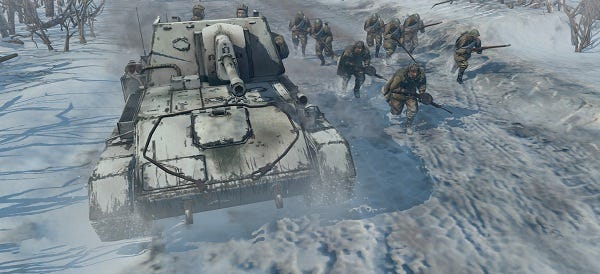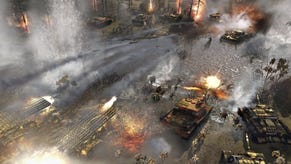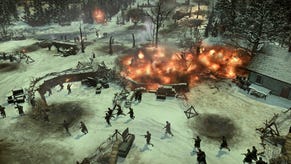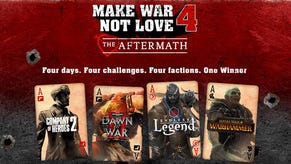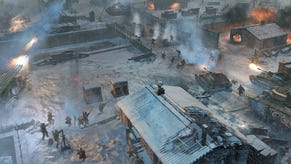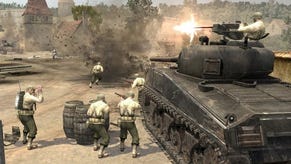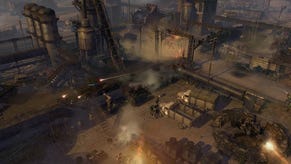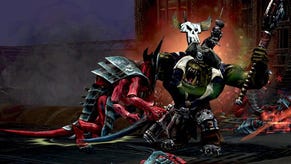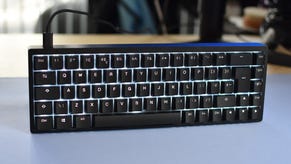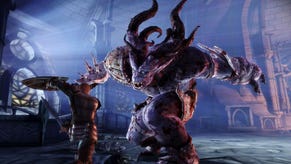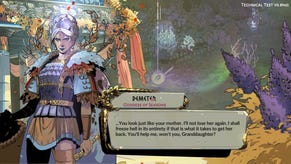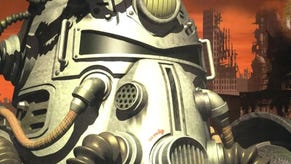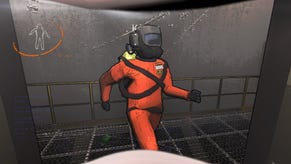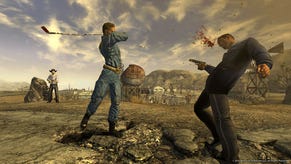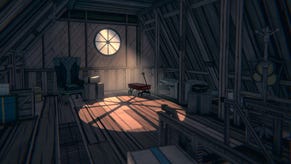Cold Front: Company Of Heroes Interview, Pt 2
From Homeworld to Motherland
Continuing a mammoth discussion about Company of Heroes 2 with Quinn Duffy (game director), Greg Wilson (producer) and Matthew Berger (senior gameplay designer), this time around we consider the future of the series, despite the sequel not being out until next year. Once that's out of the way, it's time to discuss more of the research that went into COH2 and to reflect on Homeworld.
RPS: Is Company of Heroes always going to be a WWII series? Was there ever talk of going elsewhere with it, or elsewhen even?
Duffy: Oh yeah, we talked about that a lot. One of the reasons we went back and established our creative and franchise visions was because – well, with COH the vision was very much tied to WWII. But now it’s much broader. We can apply this to any conflict. As long as we capture the tone of the location, the setting and the time period are, not irrelevant, but flexible. As long as we understand what it is about COH that we love we can maintain that vision. We can set the game in the Persian Gulf, in the Civil War…
Berger: World War I.
RPS: No one does World War I.
Duffy: There was a weird alternate history shooter one time, that was like twenty years after and it was still going on. Not very many RTS games.
RPS: Maybe a speed thing. You don’t want things to be too quick though, because people need time to think. You do that with suppression, making natural pauses. A lot of RTS games feel more like a machine that you set up beforehand and it helps to run through the mission for you. How important is the pause and continuation in your games?
Duffy: It was an important part of how we paced the original game. I don’t know if I mentioned it earlier but COH isn’t about actions per minute. I see our balance guys and testers clicking like crazy but it’s not about that. Part of the pacing and part of the reason we are we are were we’re at in development is that we looked at COH and were it had evolved to over time, over the patching process. It became a little faster paced and tactics like kiting were emerging that our systems weren’t designed and built around. We’re going back to what the point were the player has time to react to what’s happening.
Berger: As an example, units ended up doing more and more damage. We’ve dialled back the damage they do because what’s important isn’t the damage, It’s the suppression. You’re held in place and if you don’t do anything about it then you’ll be destroyed.
Duffy: This way we give both players chances to react and adapt. They can bring in new units, use a mortar, throw a grenade. Tactical options come out of systems like that.
RPS: The first time I played COH I remember some of my guys came under fire and I thought I’d screwed up, that I’d lost. But then they were pinned and I realised this was when I was needed. I had to react. It creates iconic moments. You can fill a game with plenty of moments like that by scripting them but then they are more like backdrops. How do you allow people to make their own moments? Even in multiplayer?
Berger: The game does it for us in many ways.
Duffy: We touched on the idea of COH being more than the sum of its parts. People can invest as much time as they want, digging into the depths, or play it more conventionally. Our tools are designed to create interesting outcomes. Let players experiment with what they find compelling. I don’t even care if I lose most of the time. I’ve won small victories, small engagements, helped flank somebody, done something smart. That’s enough to motivate me even if I lose. There are things that I like that aren’t even balanced but they look cool, they sound cool, they feel cool.
RPS: Balance can be the death of story. Applying skill rather than imagination can be limiting in some ways and RTS games are tending toward confrontation of skills. Do you think that’s what helps COH to feel fresh after a few years? Are you going in a different direction to everyone else?
Duffy: Well, we’re not an esport. The demands on the game and the presentation are different if that’s what you’re aiming for. Our game is very presentation heavy. Everything that’s visual in the game is underpinned by gameplay and supports gameplay. We build the tech systems to support the experience. That has created something really unique.
Berger: It has its own pace. It speaks to an audience that likes the time to make decisions on the battlefield but it’s fast paced enough that you’re not staring at a turn-based game. It’s not as unforgiving as either a fast paced esport RTS or a turn-based strategy game. It has its own area where it’s very approachable with a lot of depth that lots of people can find their own level in. When we build a game we constantly keep in mind that it’s not going to be played, mostly, by extremely hardcore players. A lot of the things in the game aren’t going to be used by hardcore players. If you look at the pure numbers it doesn’t make sense. But other players will love to use it. It’s there for them. Those people are our core.
RPS: So there was never a temptation to make an FPS sequel?
Duffy: (laughs) I wonder if the engine could handle it!
RPS: I think you have a pretty strong idea of what people expect from you. Fans can be vocal.
Duffy: There’s a huge market for a beautifully realised RTS experience. We’re going to bring that. I don’t want to say we’re old school particularly, but it’s a beautifully crafted experience with a lot of depth. The temptation to do something like an FPS just isn’t in our roots but if we did one we’d try and apply the same approach.
RPS: Speaking of roots. Homeworld! It must still be close to your hearts.
Duffy: It’s my second favourite game!
RPS: People still talk about that one too.
Wilson: Every interview almost!
RPS: If I don’t ask people will email me saying “WHY DIDN’T YOU ASK!
Duffy: You’re duty bound.
RPS: People don’t just ask about Homeworld because they love it, I don’t think, they also don’t see very much similar to take its place.
Duffy: It was groundbreaking, it was achingly beautiful, it told an amazing story. Objectively, looking back at it, we had two almost identical races. On a level of gameplay sophistication it’s relatively low. It set the tone for Relic though. The gameplay was actually kind of secondary though. We were enthralled by what we had created from a perspective more just of beauty. We were wary of messing with that.
RPS: With COH the visuals drive the systems and vice versa. It doesn’t feel like eye candy too much because it matters. Homeworld felt that the beauty was important because it communicated something as well.
Duffy: It did set the tone for the presentation of our games. People say ‘graphics don’t matter’. I’d never say that. They need to be supportive. It’s a holistic approach.
RPS: Thinking of Hearts of Iron, the Paradox game, those visuals support the system. They communicate what they need to do. You’re closer in so you need to take a different approach, although you maybe don’t HAVE to make it quite so pretty.
Wilson: We’re not done yet. It’s not currently on DX11 even, what you saw.
Duffy: Some of the features you saw are still being worked on.
RPS: What about lower spec machines.
Wilson: We haven’t locked our mid spec down yet but we want as many people as possible to play it. It’s all scalable. A lot of the time a company says min spec and those settings really damage the experience. We want the min spec to play like most companies’ recommended spec.
Duffy: You get to the point where you’re turning everything off sometimes, or you can only play at 6 frames per second, or only against one opponent.
Wilson: Yeah, to us, that’s not min spec. You might be technically playing the game but it’s not an experience we’d want you to have.
RPS: It’s kind of like watching a beautifully made film on an iPhone. It shouldn’t happen. Speaking of movies, have you seen Come and See.
Duffy: That’s from the eighties, right?
RPS: Yeah, that’s what the demo reminded me of. You talk about Band of Brothers for COH 1. COH 2 looks a lot more like that film, which is one of the bleakest films I’ve ever seen.
Wilson: I haven’t seen that.
Duffy: I have it downstairs! We watched a bunch of Eastern European and Russian movies, the quality has improved hugely. There was a series called Shtrafbat about the penal battallions. Started off really well, kind of ended a bit odd. But you get a really neat perspective of the Soviet army. Four or five hundred thousand troops went through those battallions. If they survived three months they were redeemed.
RPS: Were they court martialled guys, ex-military?
Duffy: Soemtimes they just had criminals from scouring the Gulags. A lot of them were soldiers – dereliction of duty, not saluting.
Berger: Underperforming or retreating from a battle could get a whole group put into one.
Duffy: Sometimes just suspicion. If you were behind the lines, how did you survive behind the lines?
RPS: When people say they’re bored of WWII games they often mean they’re bored of France, I think. Is there a sense of responding to those people with COH2?
Duffy: That was a motivation for us to choose the Eastern Front. We can’t ignore it. It’s the elephant in the room in many ways that we don’t talk about much in the West. There are millions of untold stories. Whether it’s WWII or some other conflict, these stories are incredible. It’s amazing to be able to tell them.
Berger: People don’t get tired of good games. If it’s a good game it’s a good game.
RPS: Thanks for your time.
